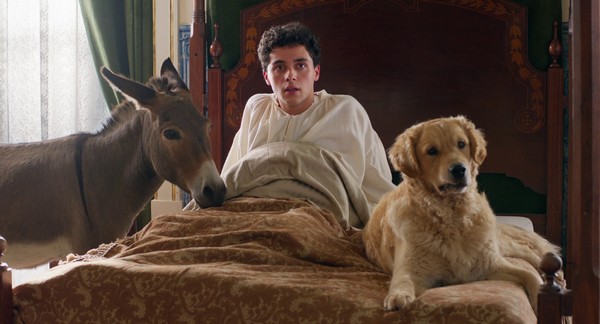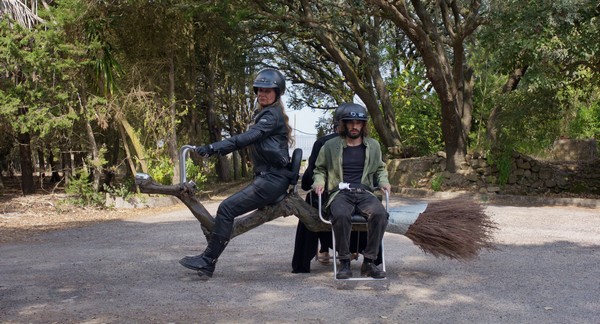 A young man embarks on a strange journey of absurd self-discovery in Eugene Green’s comic fable The Tree of Knowledge, presented as part of Fantastic Fest 2025.
A young man embarks on a strange journey of absurd self-discovery in Eugene Green’s comic fable The Tree of Knowledge, presented as part of Fantastic Fest 2025.
At some point in our lives, we must break out of the doldrums and make that journey of self-discovery. We must take in all sides, options, and chances, and see where it takes us. What does our heart say? Who do we listen to? How will the decisions made today expand to the future? How do you avoid becoming the same person continually, stuck in a cycle? These are questions Green asks for Gaspar’s journey of enlightenment in the absurd, funny, and wholly interesting The Tree of Knowledge.
Also, tourists are just the woo–oorst, am I right?
The Tree of Knowledge is a fascinating feature. It’s a low-key odyssey of oddity. Gaspar, played with a perfect wide-eyed curiosity by Rui Pedro Silva, is a young man outside of Lisbon. His mom is getting on him to get a job and do something with his life. Breaking out on his own, he sets on an absurd journey into Lisbon and onward, encountering challenges and confrontations, introspection, and existentialism.
It’s not long before he comes into the fold of Ogre, a necromancer who has claimed ot made a deal with the devil and can turn tourists (ever-present and annoying, in a great running gag) into animals for fun and profit (and food, is it cannibalism to eat someone who USED to be a person?). Gaspar could have an easy life helping out the evil with Ogre’s other helper, Leitao, but his heart knows he’s wrong and sets out with a transformed donkey and golden retriever to keep pure.
Au Hasard Balthazar or EO, but funny?
 It’s a fascinating, funny, and thought-provoking trip as the wanderers meet folks to talk about life, trapped in time aristocrats, snake women, seeing weird tombs, stuffed condemned to death dolls, mythical creatures, and the titular Tree. There’s a sharpness in the back-and-forth dialogue, with humor mined in the interactions of the various odd personalities. The highlight is the spirited Ogre and Piglet dynamic as they chase Gaspar, bicker, and come to their own terms of who they are.
It’s a fascinating, funny, and thought-provoking trip as the wanderers meet folks to talk about life, trapped in time aristocrats, snake women, seeing weird tombs, stuffed condemned to death dolls, mythical creatures, and the titular Tree. There’s a sharpness in the back-and-forth dialogue, with humor mined in the interactions of the various odd personalities. The highlight is the spirited Ogre and Piglet dynamic as they chase Gaspar, bicker, and come to their own terms of who they are.
I’ll admit, I felt like I was missing some cultural knowledge that would completely unlock The Tree of Knowledge. Some metaphors or the direct history of Portugal is going over my head. That’s okay. It’s perfectly fine for a film to speak to its specific audience and sphere of influence. And I always love to see what other cultures dig into for their story metaphor and methods. Mostly in folk horror sort of ways, but an overall outlook is still just as interesting.
I love the way it was shot, mostly. Green shoots Tree of Knowledge in a strange, matter-of-fact way. Think Wes Anderson, with much lower production value. Symmetrical shots with a stillness. Individuals are often shot on their own, centered, with cuts between each speaker, speaking lines with a purposeful pause, and staring right down the lens. It’s disconcerting but honors the deadpan separation of personalities, as most of the dialogue is spoken purposely flat. This style is infuriating to some and ingrained to others, but I love it. Green uses to highlight the separation, but in a great use of cinematography for changing character, Green opens up the shots and blocking as the film progresses.
It does have that too-clean, overlit digital cinematography that always sits wrong with me, like watching daily or the “Mexican soap opera effect.” Many aren’t bothered by this method, but I am, so take it as needed.
Tree of Knowledge seeks to have the audience think about their own balances and hypococracies of life, how can we be multiple things at once, at war with one another? It’s a fascinating tale told interestingly. X’s Tree of Knowledge is a funny, thought-provoking often-absurdist journey through life and understanding.
Tree of Knowledge is presented as part of Fantastic Fest, running September 18th through 25th in Austin, TX.
